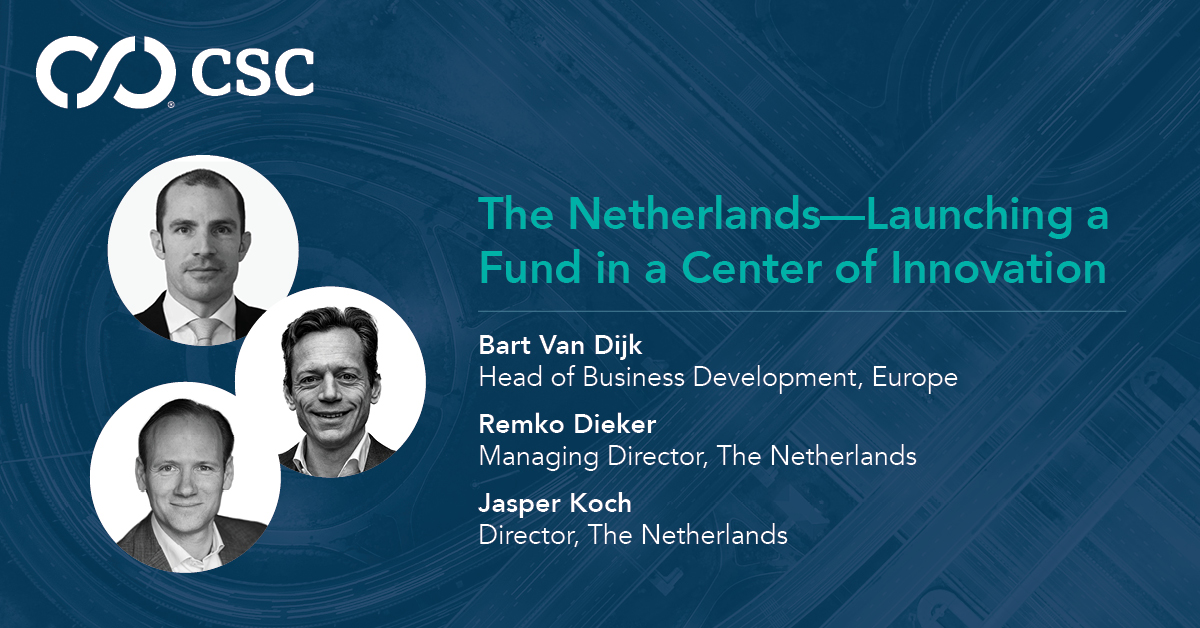
Well-known for its supportive ecosystem for startups and venture capital funding, The Netherlands provides an attractive, business-friendly tax and legal framework for fund managers seeking to enter the European market. In addition to a pro-business climate, fund managers benefit from the country’s flexible legal and governance system, political and economic stability, and tax incentives applicable to both portfolio companies and investment funds.
The Netherlands’ robust digital infrastructure ranks number two globally for online connectivity, with 98% of households having broadband connection.[1] The Netherlands is also leading the way on environmental, social, and governance (ESG) and impact funds as well as emerging sectors like green finance and RegTech. It’s no wonder The Netherlands tops the list for introducing alternative investment funds (AIF) to the European market.
An AIF can be created in a variety of structures in The Netherlands. Prominent Dutch fund structures include the CV, a limited partnership, the Coop which is generally used for private equity funds, the BV, popularly used to create fund entities, and the FGR which can be used for real estate funds, debt funds, and hedge funds.
Commanditaire Vennootschap (CV)
The CV is a limited partnership between one or more managing partners with unlimited liability and one or more limited partners with limited liability. A CV is not a separate legal entity distinct from its partners and has no legal personality. Investors participate in the CV as limited partners and receive a limited partnership interest in the investment fund. Substantially all terms and conditions of an AIF can be laid down in the limited partnership agreement of the CV.
Coöperatie (Coop)
A Coop is a form of association and is a separate legal personality from its members with legal title and beneficial ownership of its assets. Along with the CV, the Coop is a commonly used Dutch structure for private equity and venture capital funds. Investors participate in the Coop as members and hold membership interests. One of the advantages of a Coop is that it can limit the liability of the participants. The terms and conditions of the investment fund are outlined in a membership agreement and the articles of association of the Coop.
Besloten vennootschap (BV)
A Dutch BV is a private limited liability company, and generally the most popular business structure among local and foreign investors used to create an investment fund, as well as for other purposes, such as creating a management entity, carry vehicle, or co-investment vehicle. A BV is incorporated by notarised deed of incorporation that includes Articles of Association. This includes company name, city, and purpose as well as the issued share capital and paid-in capital, par value(s) of stock, and conditions for share transfer.
Fonds voor Gemene Rekening (FGR)
An FGR is not a legal entity but a contractual arrangement sui generis (often referred to as its terms and conditions) between a fund manager and each investor (i.e., the participants), obliging the fund manager to invest and manage assets contributed by the participants for their joint account. Generally, the legal ownership of the FGR assets is held by a separate legal entity (i.e., the titleholder) such as a Dutch Stichting. The FGR is the vehicle of choice for real estate funds in The Netherlands as it has the flexibility to be structured as tax-transparent, and therefore avoiding dividend withholding tax. The FGR is not dealt with in Dutch corporate law. Parties are free to determine the financial and governance structure of an FGR. The FGR is established by the execution of a notarial or private deed setting out its terms and conditions. The parties involved are the fund manager, the titleholder, and the participants.
Advantages and considerations for establishing a fund in The Netherlands
In the Netherlands, fund managers can draw upon a large, diversified financial sector and infrastructure. The pro-business atmosphere extends to regulatory oversight which includes the Dutch Central Bank (DNB) and Dutch Authority for Financial Markets (AFM). Oversight is generally considered thorough but approachable and a represents a hallmark of quality and credibility throughout Europe.
There is an increased interest in environmental, social and governance (ESG) goals and impact among fund investors worldwide. The region leads the way on ESG and emerging sectors like green finance and RegTech with a vibrant culture of innovation. Amsterdam is considered the world capital of green finance and a trendsetter in creating sustainable practices[2].
Like funds established elsewhere in Europe, an AIF established in The Netherlands is subject to the European Alternative Investment Fund Managers Directive (AIFMD) which has been incorporated into the Dutch Act on Financial Supervision (AFS).
Depending on the fund size, fund managers must obtain a registration or license from the Netherlands Authority for the Financial Markets (AFM) to manage an AIF or to market interests. Some exceptions are available such as using a passport by a licensed EU AIFM, making use of the Small Managers Regime, or registration under the National Private Placement Regime (NPPR).
Although The Netherlands’ supervisory, tax, and legal systems are business friendly and flexible, it can be a challenge for newcomers to navigate, making the case for partnering with an established fund administrator.
How CSC helps
CSC is the trusted partner of choice for more than 90% of the Fortune 500®, more than 90% of the 100 Best Global Brands®, and more than 70% of the PEI 300. We provide tailored administration and strategic outsourcing solutions to support the complex world of alternative asset managers across jurisdictions and asset types while adhering to global regulations and compliance.
Founded in 1899 and headquartered in Wilmington, Delaware, USA, CSC prides itself on being privately held and professionally managed for more than 120 years. CSC has office locations and capabilities in more than 140 jurisdictions across Europe, the Americas, Asia Pacific, and the Middle East. We are a global company capable of doing business wherever our clients are—and we accomplish that by employing experts in every business we serve. We are the business behind business®.
[1] https://investinholland.com/
[2] https://investinholland.com/doing-business-here/industries/finance/